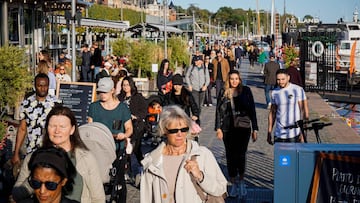How many coronavirus cases are there in Sweden without lockdown?
Anders Tegnell, Sweden's top epidemiologist, said duriung a recent interview that the country's decision not to lock down had proved the correct one.

It’s fair to say that not many people would have heard of Anders Tegnell in March. Much like Dr Anthony Fauci, who has been the public face of the Donald Trump administration’s coronavirus task force, Dr Tegnell was thrust into the limelight early in the pandemic due to his recommendation that Sweden avoid a lockdown at the same time the rest of Europe was frantically closing borders, shops, schools and the hostelry industry in a bid to curb the coronavirus pandemic.
Initially, it was reported that Tegnell, the State Epidemiologist of the Public Health Agency of Sweden, was suggesting that the country adopt the herd immunity tactic that had been initially derided and, ultimately, abandoned in the UK while being described as “not an option” by the Indian Ministry of Health in July.
However, as Tegnell explained in an interview with Nature in April, it was never the Swedish government’s intention to seek herd immunity, but more of a tradition of mass public common sense known as Folkvett.
Tegnell: "This is not a disease that can be stopped"
Anders Tegnell, Sweden’s chief epidemiologist: 'We looked at the [Imperial] model and we could see that the variables put into the model were quite extreme.. Why did they choose variables that gave extreme results? So we were always quite doubtful.' https://t.co/C6rVmTOeeX pic.twitter.com/MAhba1kX4O
— The Spectator (@spectator) September 20, 2020
“I think it has been overstated how unique the approach is. As in many other countries, we aim to flatten the curve, slowing down the spread as much as possible — otherwise the health-care system and society are at risk of collapse.
“This is not a disease that can be stopped or eradicated, at least until a working vaccine is produced. We have to find long-term solutions that keeps the distribution of infections at a decent level. What every country is trying to do is to keep people apart, using the measures we have and the traditions we have to implement those measures. And that’s why we ended up doing slightly different things.
“The Swedish laws on communicable diseases are mostly based on voluntary measures — on individual responsibility. It clearly states that the citizen has the responsibility not to spread a disease. This is the core we started from, because there is not much legal possibility to close down cities in Sweden using the present laws. Quarantine can be contemplated for people or small areas, such as a school or a hotel. But [legally] we cannot lock down a geographical area.”
Some measures were put in place: schools for under-16s remained open but higher education made the move to online classes. Gatherings of more than 50 people were banned in March and bars offered table service only. The over-70s were told to remain at home, people were asked to work from home if possible and no mandatory face mask order was introduced but life went on more as less as it had before the pandemic - although Tegnell told France-24 this month that the notion of business as normal was not entirely accurate.
Sweden seeking "sustainable" approach to Covid-19 battle

Initially, Sweden’s tactic drew criticism from within and abroad. But now the consensus is that the strategy largely worked. In the France-24 interview, Tegnell explained that Sweden had adopted a long-term “sustainable” strategy rather than adopting the same measures as other countries who “lock down, open up and lock down over and over again.”
With local quarantine zones being imposed across Europe as the feared second wave of Covid-19 surges on the continent, raising the spectre of renewed national lockdowns, Sweden remains open. And, crucially, among the least-affected countries in Europe with winter approaching.
According to the European Centre for Disease Prevention and Control, Sweden has one of the lowest cumulative 14-day caseload totals in the EU/EEA/UK at 26.7 per 100,000 inhabitants. By contrast, Spain’s figure stands at 300.5, France at 192.5 and the UK at 70.7 – all of the latter three have recently exited lockdowns of varying degrees of stringency.
The number of deaths from Covid-19 in Sweden per 100,000 inhabitants over the past 14 days (up to September 21) stands at 0.2 (although it should be noted Sweden now only updates Covid-19 daily figures from Tuesday to Friday, affecting cumulative figures). On 20 September, there were 168 cases reported in the entire country, the lowest figure since 26 March.
In total, Sweden currently has 5,865 Covid-related deaths, where as in many countries they have tragically been centred on care homes for the elderly. Plans are in place to re-open nursing homes to visitors again in October.
Under the leadership of epidemiologist #AndersTegnell, #Sweden has crushed #Covid19 without imposing a single #Lockdown. The Swedish secret: think big picture, keep politics out of public health, and nurture the free market. pic.twitter.com/W1mqYIYinb
— Steve Hanke (@steve_hanke) September 19, 2020
Herd immunity "not part of any public health policy"
Related stories
Speaking to France-24, Tegnell reiterated herd immunity was not the goal of Sweden’s coronavirus strategy. “People getting infected on purpose is of course not in accordance with any public health policy. We tried to slow down the spread of the virus as much as anybody else in any other country. And we managed to slow it down just as much as most other countries. It took slightly longer than other countries.
“On the other hand, we don't have the resurgence of the disease that those countries have."

